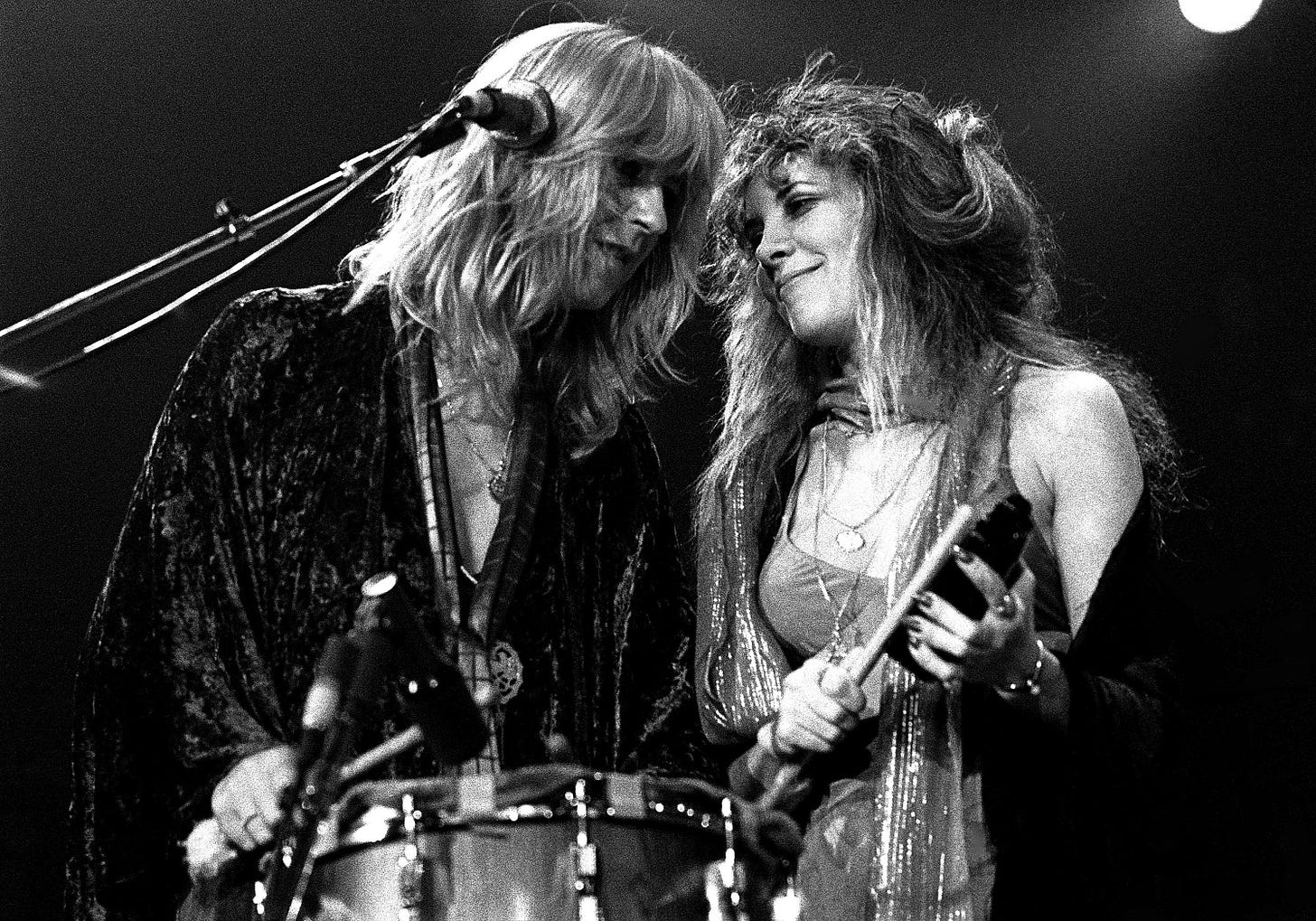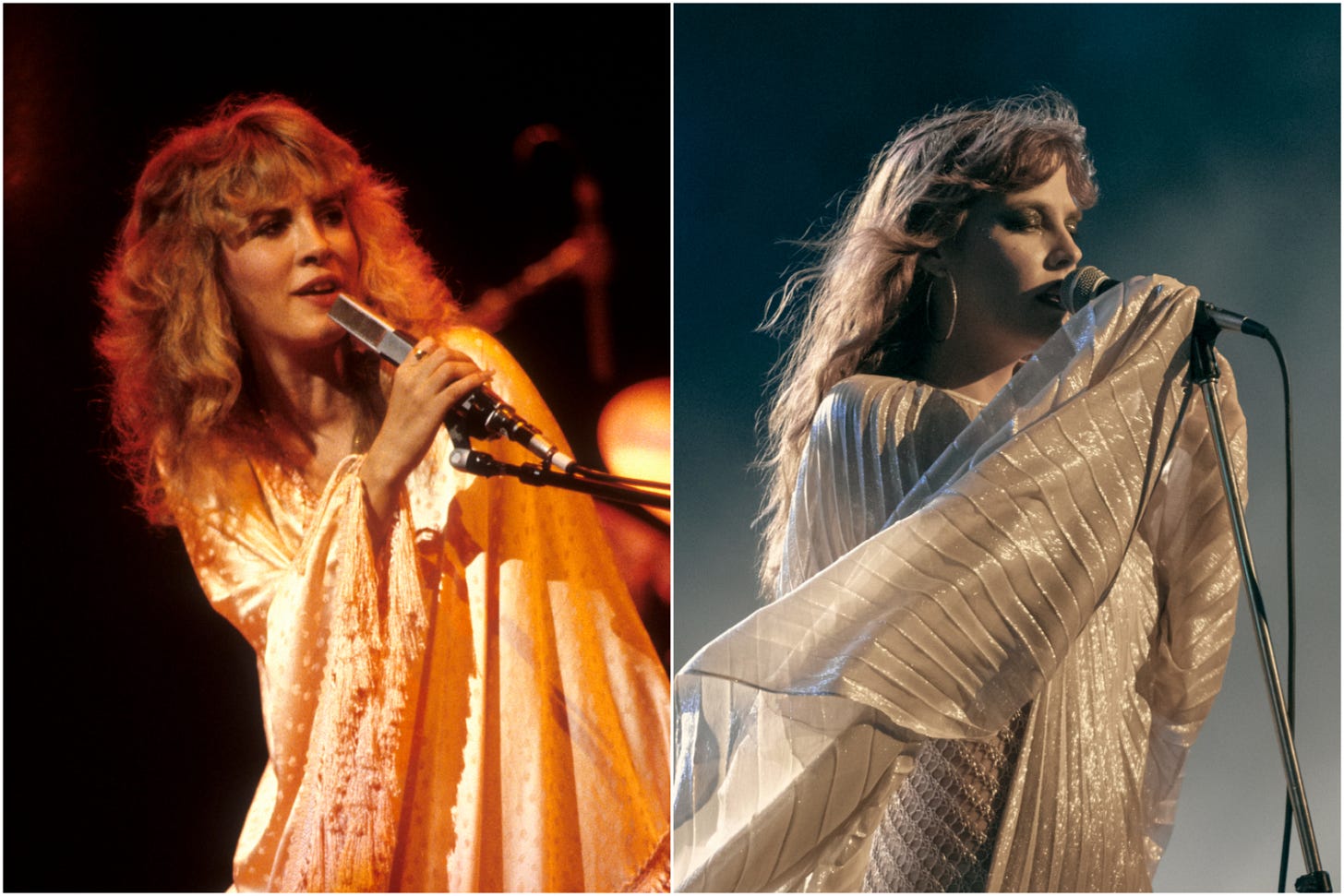The first record I ever bought was Rumours by Fleetwood Mac. I didn’t actually own a record player at the time, but I was going through a horrible breakup and sharing about it on the internet, knowing people were talking about me on an online snark forum I used to read at the time. I bought a cheap 12 x 12 square frame and stuck the album on my wall.
Like everyone else, I read Daisy Jones & The Six when it first came out – about a year before I bought Rumours on vinyl. ICYMI, Taylor Jenkins Reid’s wildly popular novel is loosely inspired by the making of Rumours in 1976. I binged the TV series in 2023 as it was released and actually couldn’t fucking believe how good it was. I just re-watched the entire thing again, two years later, and my opinion still stands. Daisy Jones and Billy Dunne’s tumultuous artistic and personal relationship is just absolute A+ television, and of course I loved Karen Sirko’s abortion storyline. The entire series is, in a word, powerful.
Karen is, of course, inspired by the late Christine McVie, who wrote the song my husband and I walked back down the aisle to after our friend pronounced us husband and wife. (“Everywhere” – an absolute masterpiece). We were born on the same day, 46 years apart. Christine McVie never had kids in real life, and either did Karen Sirko. She died in 2022, and Stevie Nicks once tweeted that she wished Christine could have seen the show that was partially inspired by their lives.
Whenever I watch a series that was a book first, I’m always keeping an eye out for what they changed and why. It’s rare, but Daisy Jones & The Six is actually better as a show, since the book is told in multi-POV interview format 20 years after the band broke up. It’s creative narrative framing, but the show is more raw and emotional, not to mention the songs, which are essential to the experience. I was on board with pretty much every change they made except for one.
Stevie Nicks, living legend at 76 years old and the inspiration for the character of Daisy Jones, chose not to have children in real life. She, like fictional Karen, had an abortion in 1977, effectively choosing Fleetwood Mac over having a child. According to Nicks, Fleetwood Mac would have been “done” if she hadn’t made that decision. Here’s what she said in an interview with Rolling Stone last year:
Angie Martoccio (interviewer): “Did you ever look back and wish that you had had children or —”
Stevie Nicks: “Never. Maybe I knew then that I had to be me, in Fleetwood Mac, a huge band that was on its way to being legendary, to be able to be the lighthouse. Not only did it allow me to follow my dream of being this rock & roll woman, but it allowed me to be this person that just wrote this song.* I wanted to write something that would be helpful in this situation, because this could be my finest hour. This could be the most important thing I’ve ever done, this song.”
*She’s talking about her 2024 song, “The Lighthouse.” Nicks was a huge supporter of Kamala Harris in the 2024 election, even though she voted for the first time at age 70.
In the show, part of Daisy’s character redemption arc is that she has a daughter after the band breaks up. Taylor Jenkins Reid didn’t write it that way, though. She had Daisy go to rehab and adopt two sons, which is close, but not at all the same. It’s a small change, but within the context of Stevie Nicks’ real life, I think it’s an important one. It’s almost as if the showrunners decided Karen/Christine’s story was sufficient enough – like you didn’t need two child-free by choice women on the same TV show.
The real women of Fleetwood Mac chose their art over becoming mothers. Doesn’t it feel important that all the men of Fleetwood Mac (Mick Fleetwood, Lindsey Buckingham, and John McVie) had children, but the women never did?
Despite the fact that Daisy Jones & The Six wasn’t a straight retelling, I wish we would have honored this part of Stevie Nicks’ story. I kind of idolize these two a bit, you know what I mean? Let’s not make Daisy Jones into a mother at the end just because it makes her life feel more virtuous. Her art was enough of a contribution to the world.

“Does The Knot Have a Fake Brides Problem?” by Adam Iscoe for The New Yorker
When I was in my mid-twenties, I worked for a small business that sold vintage engagement rings to millennials, and we did some advertising with The Knot. (I didn’t look at the site once when I was planning my own wedding, though.) This article is the juicy, gossipy rag on The Knot I didn’t know I needed:
“Often, he’d talk to the potential customers by phone. “It felt like all the brides were reading from a script,” he said. “I could hear other calls in the background, and they all had the same lilting tone. That’s when I realized, they have a literal phone bank of people who are faking leads.”
Matt Pierce, a wedding photographer in Texas, said that he’d exchanged e-mails with someone who was getting married in a few days. Pierce called the wedding venue, he told me, and the woman who ran it said, “You, too, huh? You’re about the twelfth photographer that’s called here today about a wedding this weekend.” There was no wedding.”
“The New Singlehood Stigma” by Faith Hill for The Atlantic
It’s so true that singlehood is equally disparaged and celebrated by society, simultaneously, and that gives single women especially a bit of whiplash:
“For the pursuit of romance to carry any shame is especially odd in 2025, when online dating, now the primary way partners meet, requires that you cop to having some desire. (Your profile isn’t going to create itself.) Instead of just acknowledging that totally commonplace aspiration, though, we romanticize serendipity: People hope that love will fall into their lap so they never need to debase themselves by seeking it, or they say they’re just poking around on the apps out of casual curiosity. The culture tells us, simultaneously, that we should be in a couple and that we should feel whole all by ourselves. We should have a partner, but we shouldn’t want one.”
“Are People Bad at Their Jobs… or Are The Jobs Just Bad?” by Anne Helen Petersen for Culture Study
This essay had me nodding the whole way through. Anne Helen Petersen dives into some of the differences between a seemingly similar good job (UPS delivery driver) and a bad one (FedEx delivery driver) and how that affects job performance:
“People are bad at their jobs is a sibling, of course, to no one wants to work anymore: the refrain of peak pandemic years. But both are deflections from what actually makes people “bad” at their jobs — or disincentivizes people to work. The truth is: the jobs are bad.”
Motherhood by Sheila Heti found me at a weird time. I bought it maybe a year ago, but didn’t read it until a friend of mine bought it independently and we decided to do a buddy read last month. I’m not a religious person, but if I was, I think Motherhood would by my version of the bible. Despite the somewhat misleading title, it’s about the “wrestling place,” or the place each woman on the fence (especially if they are leaning “no”) goes to decide whether or not to have children. The last line of the book gobsmacked me so hard I would consider tattooing it on my body. I loved this book so much it’s inspired an idea for a new series I’ll announce soon… stay tuned!
Last month, a woman on Instagram posted a viral Reel (2 million views) about why women shouldn’t take their husband’s last names. Predictably, she got a ton of backlash and women defending their choice to take their husband’s last names in her comments section, and then she posted this Reel (above) in response. It reminded me a little of how people got so pissed at Chappell Roan last week:
“No hate to this commenter whatsoever, but I do think it’s interesting that I made a video about how women shouldn’t have to change their last names when they get married, and now I have hundreds of women in my comments defending their decision to take their husband’s name. All I want to say is that you don’t have to defend it, because it’s already the norm. The vast majority of women take their husband’s name. Everybody’s doing it. And more than it just being the norm, it is expected of you. You will receive zero pushback when you decide to take your husband’s name. You know who does receive a ton of pushback? Women who want to keep their own name. There is absolutely no need to defend something that is not at risk.” – @mayorhaley
Are you a Fleetwood Mac fan? What did you think about Daisy Jones & The Six? (The novel and the show?)















"Let’s not make Daisy Jones into a mother at the end just because it makes her life feel more virtuous. Her art was enough of a contribution to the world." This. Thank you!
New subscriber who is enjoying these back issues. Love stumbling on your work Kelly. As a married 42 year old woman who chose not to have kids, I feel better about my decision with each passing year. I relate so so much to all of your essays.